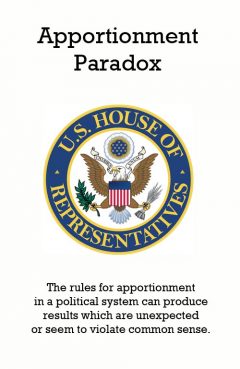Apportionment Paradox

Release Date: //
Country of Release:
Length:
MPAA:
Medium: Paradox
Genre:
Release Message: The rules for apportionment in a political system can produce results which are unexpected or seem to violate common sense.
Description: An apportionment paradox exists when the rules for apportionment in a political system produce results which are unexpected or seem to violate common sense. To apportion is to divide into parts according to some rule, the rule typically being one of proportion. Certain quantities, like milk, can be divided in any proportion whatsoever; others, such as horses, cannot - only whole numbers will do. In the latter case, there is an inherent tension between our desire to obey the rule of proportion as closely as possible and the constraint restricting the size of each portion to discrete values. This results, at times, in unintuitive observations, or paradoxes. Several paradoxes related to apportionment, also called fair division, have been identified. In some cases, simple adjustments to an apportionment methodology can resolve observed paradoxes. Others, such as those relating to the United States House of Representatives, call into question notions that mathematics alone can provide a single, fair resolution. Some systems of apportioning representation can have unintuitive results due to rounding